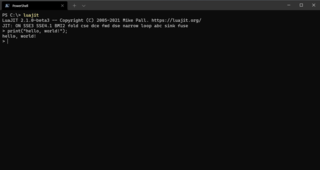Related Research Articles
In computing, a compiler is a computer program that translates computer code written in one programming language into another language. The name "compiler" is primarily used for programs that translate source code from a high-level programming language to a low-level programming language to create an executable program.

A Java virtual machine (JVM) is a virtual machine that enables a computer to run Java programs as well as programs written in other languages that are also compiled to Java bytecode. The JVM is detailed by a specification that formally describes what is required in a JVM implementation. Having a specification ensures interoperability of Java programs across different implementations so that program authors using the Java Development Kit (JDK) need not worry about idiosyncrasies of the underlying hardware platform.

Lua is a lightweight, high-level, multi-paradigm programming language designed primarily for embedded use in applications. Lua is cross-platform, since the interpreter of compiled bytecode is written in ANSI C, and Lua has a relatively simple C API to embed it into applications.

In computer science, an interpreter is a computer program that directly executes instructions written in a programming or scripting language, without requiring them previously to have been compiled into a machine language program. An interpreter generally uses one of the following strategies for program execution:
- Parse the source code and perform its behavior directly;
- Translate source code into some efficient intermediate representation or object code and immediately execute that;
- Explicitly execute stored precompiled bytecode made by a compiler and matched with the interpreter's Virtual Machine.
Bytecode is a form of instruction set designed for efficient execution by a software interpreter. Unlike human-readable source code, bytecodes are compact numeric codes, constants, and references that encode the result of compiler parsing and performing semantic analysis of things like type, scope, and nesting depths of program objects.
In computing, just-in-time (JIT) compilation is compilation during execution of a program rather than before execution. This may consist of source code translation but is more commonly bytecode translation to machine code, which is then executed directly. A system implementing a JIT compiler typically continuously analyses the code being executed and identifies parts of the code where the speedup gained from compilation or recompilation would outweigh the overhead of compiling that code.
Metaprogramming is a programming technique in which computer programs have the ability to treat other programs as their data. It means that a program can be designed to read, generate, analyse or transform other programs, and even modify itself while running. In some cases, this allows programmers to minimize the number of lines of code to express a solution, in turn reducing development time. It also allows programs a greater flexibility to efficiently handle new situations without recompilation.

PyPy is an implementation of the Python programming language. PyPy often runs faster than the standard implementation CPython because PyPy uses a just-in-time compiler. Most Python code runs well on PyPy except for code that depends on CPython extensions, which either does not work or incurs some overhead when run in PyPy.
Application virtualization software refers to both application virtual machines and software responsible for implementing them. Application virtual machines are typically used to allow application bytecode to run portably on many different computer architectures and operating systems. The application is usually run on the computer using an interpreter or just-in-time compilation (JIT). There are often several implementations of a given virtual machine, each covering a different set of functions.
Haxe is a high-level cross-platform programming language and compiler that can produce applications and source code for many different computing platforms from one code-base. It is free and open-source software, released under the MIT License. The compiler, written in OCaml, is released under the GNU General Public License (GPL) version 2.
In computer programming, a programming language implementation is a system for executing computer programs. There are two general approaches to programming language implementation:
In computer science, ahead-of-time compilation is the act of compiling an (often) higher-level programming language into an (often) lower-level language before execution of a program, usually at build-time, to reduce the amount of work needed to be performed at run time.
The Berkeley Packet Filter is a network tap and packet filter which permits computer network packets to be captured and filtered at the operating system level. It provides a raw interface to data link layers, permitting raw link-layer packets to be sent and received, and allows a userspace process to supply a filter program that specifies which packets it wants to receive. For example, a tcpdump process may want to receive only packets that initiate a TCP connection. BPF returns only packets that pass the filter that the process supplies. This avoids copying unwanted packets from the operating system kernel to the process, greatly improving performance. The filter program is in the form of instructions for a virtual machine, which are interpreted, or compiled into machine code by a just-in-time (JIT) mechanism and executed, in the kernel.
V8 is a JavaScript and WebAssembly engine developed by Google for its Chrome browser. V8 is free and open-source software that is part of the Chromium project and also used separately in non-browser contexts, notably the Node.js runtime system.

LuaJIT is a tracing just-in-time compiler for the Lua programming language. Mike Pall, a primary maintainer of the project had resigned in 2015, resorting only to occasional patching to the future 2.1 version.
Tracing just-in-time compilation is a technique used by virtual machines to optimize the execution of a program at runtime. This is done by recording a linear sequence of frequently executed operations, compiling them to native machine code and executing them. This is opposed to traditional just-in-time (JIT) compilers that work on a per-method basis.

GraalVM is a Java Development Kit (JDK) written in Java. The open-source distribution of GraalVM is based on OpenJDK, and the enterprise distribution is based on Oracle JDK. As well as just-in-time (JIT) compilation, GraalVM can compile a Java application ahead of time. This allows for faster initialization, greater runtime performance, and decreased resource consumption, but the resulting executable can only run on the platform it was compiled for. It provides additional programming languages and execution modes. The first production-ready release, GraalVM 19.0, was distributed in May 2019. The most recent release is GraalVM for JDK 21, made available in September 2023.
HipHop Virtual Machine (HHVM) is an open-source virtual machine based on just-in-time (JIT) compilation that serves as an execution engine for the Hack programming language. By using the principle of JIT compilation, Hack code is first transformed into intermediate HipHop bytecode (HHBC), which is then dynamically translated into x86-64 machine code, optimized, and natively executed. This contrasts with PHP's usual interpreted execution, in which the Zend Engine transforms PHP source code into opcodes that serve as a form of bytecode, and executes the opcodes directly on the Zend Engine's virtual CPU.

WebAssembly defines a portable binary-code format and a corresponding text format for executable programs as well as software interfaces for facilitating interactions between such programs and their host environment.
References
- ↑ Xu, Haoran; Kjolstad, Fredrik (2021-10-15). "Copy-and-patch compilation: a fast compilation algorithm for high-level languages and bytecode". Proceedings of the ACM on Programming Languages. 5 (OOPSLA): 136:1–136:30. arXiv: 2011.13127 . doi:10.1145/3485513.
- ↑ Xu, Haoran (2023-05-12). "Building a baseline JIT for Lua automatically". sillycross.github.io. Retrieved 2024-01-11.
- ↑ "Python 3.13 gets a JIT". tonybaloney.github.io. Retrieved 2024-01-09.
- ↑ "GH-113464: A copy-and-patch JIT compiler by brandtbucher · Pull Request #113465 · python/cpython". GitHub. Retrieved 2024-01-09.